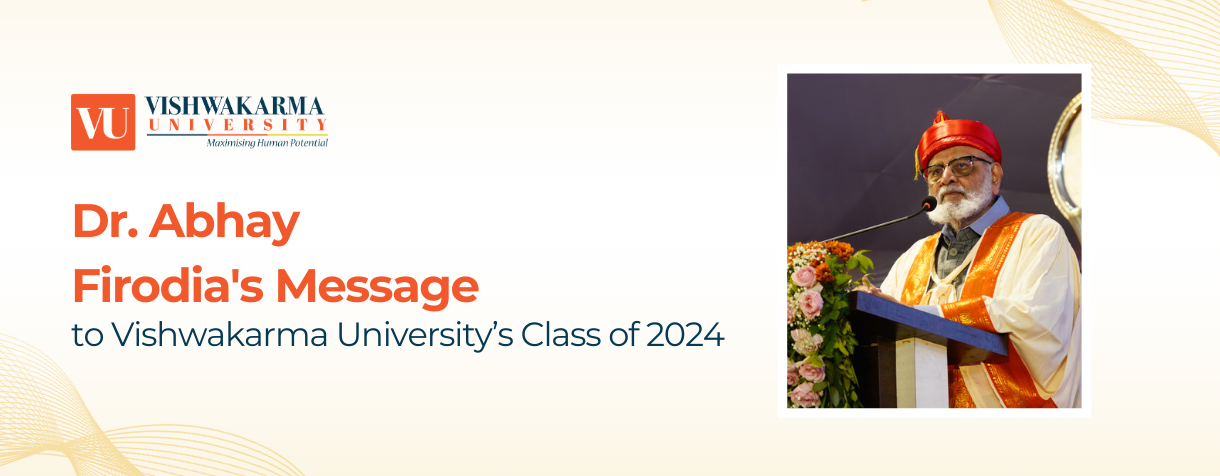Dr. Firodia began by emphasising that the journey students were now embarking upon was more than a pursuit of career and success—it was a path of lifelong learning, deeply rooted in Indian culture and civilisation. He spoke of the importance of understanding India's foundational philosophies, which are embedded in the Vedic and Shraman traditions. For Dr. Firodia, these ancient teachings are more than historical facts; they are blueprints for a meaningful life in a modern, globalised world. He urged the graduating class to not only cherish their educational accomplishments but to strive for a deeper understanding of the values and knowledge that have been passed down through generations.
One of the core elements of his speech was the concept of Saraswati, the goddess of knowledge, whom he described as central to Indian civilisation. For Dr. Firodia, the reverence for Saraswati highlights the significance that Indian culture has always placed on learning, wisdom, and intellectual pursuit. His reflections on Saraswati’s mythical connection to the Saraswati River symbolised the flow of wisdom through India's historical narrative, underscoring the belief that knowledge is not peripheral but foundational to personal and societal growth.
Dr. Firodia also drew attention to the concept of the "Four Ashrams" of life, as outlined in Indian tradition: Brahmacharya (the pursuit of knowledge), Grihastha (engagement in family and social responsibilities), Vanaprastha (gradual withdrawal from active life), and Sannyasa (renunciation). He noted that students, having now completed the Brahmacharya phase, were entering the Grihastha phase. However, he stressed that this transition should not be viewed as a rigid shift but rather a seamless progression. By continuing to embrace both learning and service, graduates would fulfil their roles as contributors to society.
A powerful part of his speech was his emphasis on the "Three Es": Education, Enterprise, and Ethics. While education forms the foundation, Dr. Firodia explained that it alone does not guarantee success. The second pillar, enterprise, requires that graduates not only use their knowledge but also innovate and create to bring value to society. He reminded them that knowledge without action is incomplete, and action without purpose is hollow. Through enterprise, graduates could put their education to use, contributing to the prosperity and development of the nation.
The final "E" was ethics, a quality that he viewed as the cornerstone of a purposeful life. He spoke of Dharma, not as a religious construct but as a commitment to core human values. Dr. Firodia explained that ethics, grounded in self-discipline and integrity, would ultimately shape the impact graduates would have on the world. True success, he noted, would come to those who practised these values, not just as professional obligations but as guiding principles in all aspects of life.
Throughout his speech, Dr. Firodia also touched on India’s rich linguistic heritage, specifically highlighting Prakrit and Sanskrit, which have historically been vehicles of culture and tradition. He explained that languages such as Sanskrit, with their precise structure and stable vocabulary, contributed to India’s scientific and philosophical accomplishments. Encouraging the graduates to value their own linguistic and cultural heritage, he hoped they would be able to draw strength from India’s unique civilisation as they move forward in their careers.
In his closing remarks, Dr. Firodia addressed the importance of staying connected—not only to one’s cultural roots but also to one’s peers and mentors. Reflecting on his own personal anecdotes, he shared how maintaining relationships with colleagues and mentors had proven beneficial in his career. By staying in touch, he explained, graduates would find that mutual support and shared experiences could often be invaluable.
In a world rapidly embracing change, Dr. Firodia’s message was one of grounded optimism. He encouraged the Class of 2024 to be open to innovation while remaining deeply anchored in values that have guided Indian civilisation for millennia. As graduates celebrated their achievements and looked toward their futures, they carried with them a message that true progress is built on education, driven by enterprise, and sustained by ethics. With this, Dr. Firodia left the Class of 2024 with the understanding that they are not merely recipients of a degree; they are inheritors of a legacy and stewards of a future that they have the power to shape.




